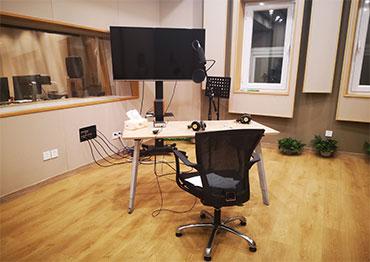Audio drama emerged in the US and UK in the 1920s on radio, becoming immediately popular in the days before television. The first radio drama in China was about the war to resist Japanese aggression, called Horrible Memories, and was broadcast in 1933 in Shanghai. After the founding of the People’s Republic of China in 1949, China National Radio (CNR) broadcast its first drama in 1950. Radio drama was very popular in China for several decades until the 1990s when it gradually lost momentum as other forms of entertainment took over.
Jiang Guangtao, a 45-year-old voice actor and founder of recording studio Voicegem, recorded dramas for radio stations in the 1990s. He described the experience as “fun” as audio drama doesn’t require lip syncing and provides some room for improvisation. In recent years he started doing audio dramas again as podcasting became popular.
Unlike film or TV, audio dramas create infinite room for the imagination. “Listeners can create their own images based on their moods, experiences and circumstances, which could alter the story. But this richness in interpretation is what we strive for as actors,” Jiang told NewsChina.
It is not easy to produce a quality drama with sound alone. Besides a fine vocal tone, actors need strict training and practice and the ability to make the most of sound during a performance. Bian Jiang, an actor who studied dubbing at Beijing Film Academy, told NewsChina that when producing an audio drama, the first thing they do is study the script. An episode is about 20 minutes and an experienced actor can do five to seven episodes a day. But the preparation and recording processes take much longer. Bian said they once spent seven days recording one episode, and they have to keep trying until the actor develops a feel for the character. Apart from the dialogue, the performers need to act out other sound effects, like chewing, crying or struggling. The best audio drama actors can build pictures in audiences’ minds only with sound.
By the 21st century, broadcast media began to wane and audio drama went out of fashion. But it seized the chance provided by the internet as a new media and moved online, gradually regaining its lost popularity.
It is a group of young people who love danmei and ACG culture (anime, comics and games) that helped realize the transformation. They gathered on forums and produced their favorite audio dramas. In 2000, audio drama fans on E-time Forum produced the first online audio drama in Chinese – Watch Out the Car. Around 2005, radio drama fans on online literature websites began putting out their own audio dramas, as well as crowdsourced translations of Japanese audio dramas.
Along the way, many amateur dubbing fans became professional voice actors. Zhang Jie, founder of 729 Voice Studio, was a fan of online audio drama and later became a professional actor for TV, cartoons and audio dramas.
Noticing the new trend, Jiang, who had no previous experience in ACG culture and seldom read online literature, started making online audio dramas. As the opportunities poured in, he became a voice actor specializing in these genres.
Jiang started Voicegem in 2010. Bian Jiang and Zhang Jie opened their own studios in 2016. At that time, their main business was still dubbing, but they also started to cover music production, audio dramas and cartoons. These efforts helped break down the barriers between fields and draw fans to audio drama.
Between 2011 and 2013, online podcast apps such as Qingting FM, Himalaya and Lizhi FM emerged. Since then, podcast platforms mushroomed. Coupled with the fast growth in related fields like audio books and livestreaming, the online audio industry has taken shape in just a few years.
Audio drama was able to carve out its own niche. In 2014, audio platform MissEvan was established. Audio drama is one of its most popular segments along with audio manga and books. Many other major platforms including Himalaya and Qingting FM also host audio dramas.

 Old Version
Old Version
